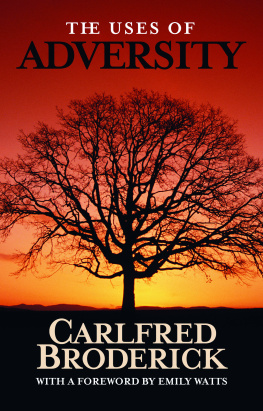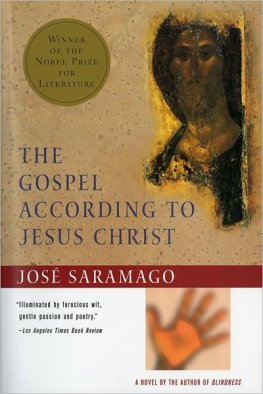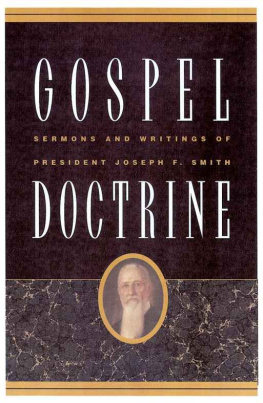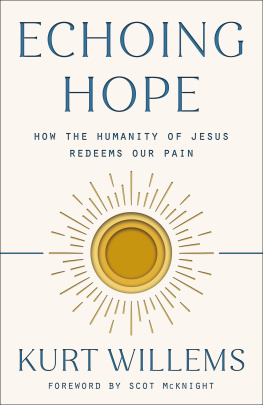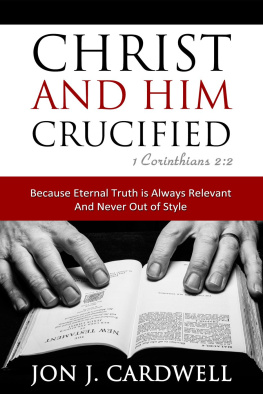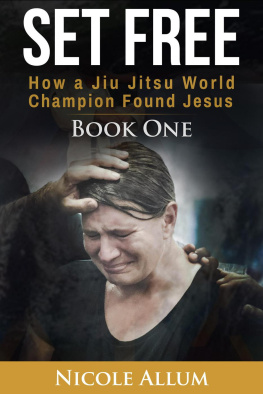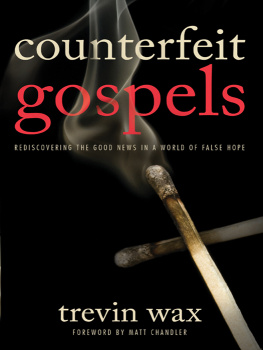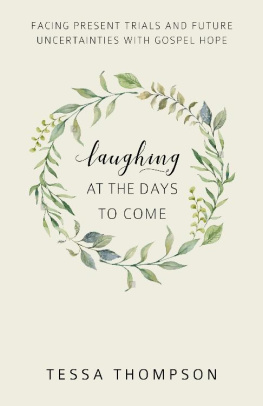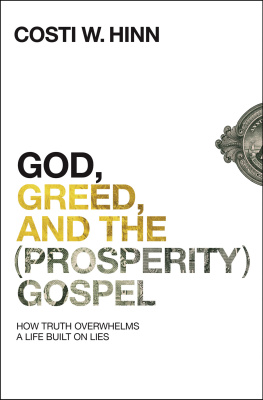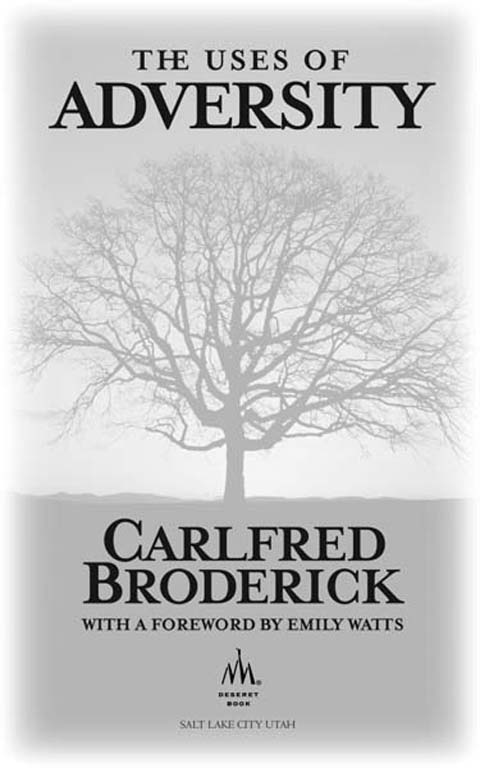2008 Carlfred Broderick.
All rights reserved. No part of this book may be reproduced in any form or by any means without permission in writing from the publisher, Deseret Book Company, P.O. Box 30178, Salt Lake City Utah 30178. This work is not an official publication of The Church of Jesus Christ of Latter-day Saints. The views expressed herein are the responsibility of the author and do not necessarily represent the position of the Church or of Deseret Book. Deseret Book is a registered trademark of Deseret Book Company.
Visit us at DeseretBook.com
Library of Congress Cataloging-in-Publication Data
Broderick, Carlfred Bartholomew.
The uses of adversity/Carlfred Broderick; with a foreword by Emily Watts.
p. cm.
ISBN-13: 978-1-59038-851-8 (hardbound: alk. paper)
1. SufferingReligious aspectsChurch of Jesus Christ of Latter-day Saints. 2. SufferingReligious aspectsMormon Church. 3. Suffering. 4. PainReligious aspectsChurch of Jesus Christ of Latter-day Saints.
5. PainReligious aspectsMormon Church. 6. PainPsychological aspects. I. Title.
BX8643.S93B76 2007
248.8'6dc22 2007043844
Printed in the United States of America
Worzalla Publishing, Co., Stevens Point, WI
10 9 8 7 6 5 4 3 2 1
Foreword
What do you say to a person in pain? What kind of answers are there for the truly hard questions of life, the imponderables, the times when every piece of counsel or word of comfort that comes to mind just seems hollow?
I've wrestled with those questions for years. And I know others have as well, because many of my friends have asked me, as a book person, what reading I might recommend for someone who was undergoing a particularly soul-wrenching trial.
I never had quite the right answer, until the day a few years ago when I encountered Carlfred Broderick's incredible essay on the uses of adversity. First delivered as an address at a BYU Women's Conference, this insightful look at the pain inherent in our mortal experience changed my outlook forever. I have pondered it again and again. Over the years I have found myself sharing the stories with friends, using them in lessons, thinking of them when I felt I was floundering in my own (relatively minor) difficulties.
The gospel of Jesus Christ is not insurance against pain, writes Dr. Broderick. It is resource in event of pain, and when that pain comes rejoice that you have resource to deal with your pain. He goes on to demonstrate the amazing resource that is available to all of us through the atonement of Jesus Christ. And he does it with real-life examples of the hardest kinds of pain imaginable, from a mother who watches her family abandon the standards of the gospel to cases of abuse to the accidental death of a child.
Maybe I resonate with Dr. Broderick's approach because I'm a story person myself, and he makes his various points with true stories. Perhaps I am particularly swept away by his engaging writing style. But I think the real reason this work touches me so deeply is that it speaks the truth, the hard truth, about the way life is and illustrates the kind of faith we all ultimately have to find in order to get through it.
When there are no earthly answers, when our understanding is stretched beyond its limit, when mortality is simply too much for us, there is hope. As one bereaved mother said, I am content that God be God. I know he lives and loves us, that he is God. He's not unmindful of us. We do not suffer out of his view. I used to think we were safe from grief and pain here because of our faith. I know now that is not true, but we are safe in his love. We are protected in the most ultimate sense of allwe have a safe home forever. That is my witness.
It is also Carlfred Broderick's witness, a legacy he left behind when he died of cancer in July 1999 at the age of 67. It is my great joy that this resource in event of pain is once again being made available to help an even wider group of people. I have never read a finer treatment of the role adversity can play in the life of a person who understands the gospel of Jesus Christ.
Emily Watts
The Uses of Adversity
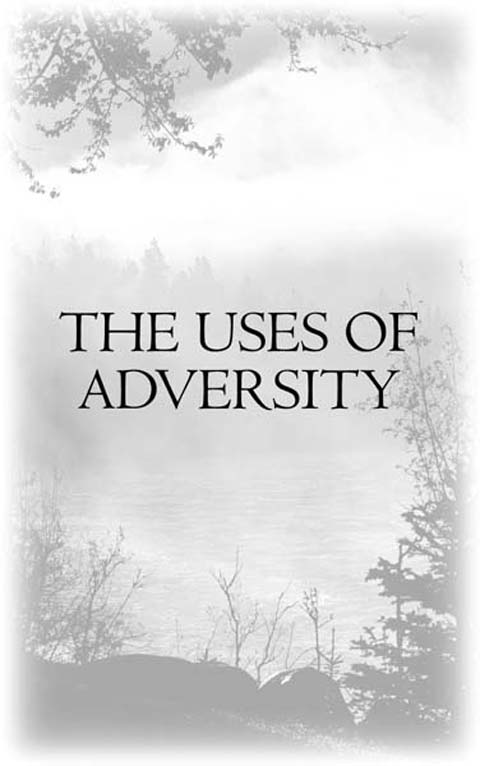
While I was serving as a stake president, I was once sitting on the stand at a combined meeting of the stake Primary board and stake Young Women's board where they were jointly inducting from the Primary into the Young Women's organization the eleven-year-old girls who that year had made the big step. They had a lovely program. It was one of those fantastic, beautiful presentationsa take-off on The Wizard of Oz, where Dorothy, an eleven-year-old girl, was coming down the yellow brick road together with the Tin Woodman, the Cowardly Lion, and the Scarecrow. They were singing altered lyrics about the gospel. And Oz, which was one wall of the cultural hall, looked very much like the Los Angeles Temple. They really took off down that road. There were no weeds on that road; there were no Munchkins; there were no misplaced tiles; there was no Wicked Witch of the West. That was one antiseptic yellow brick road, and it was very, very clear that once they got to Oz, they had it made. It was all sewed up.
Following that beautiful presentation with all the snappy tunes and skipping and so on, came a sister who I swear was sent over from Hollywood central casting. (I do not believe she was in my stake; I never saw her before in my life.) She looked as if she had come right off the cover of a fashion magazineevery hair in placewith a photogenic returned missionary husband who looked like he came out of central casting and two or three, or heaven knows how many, photogenic children, all of whom came out of central casting or Kleenex ads or whatever. She enthused over her temple marriage and how wonderful life was with her charming husband and her perfect children and promised that the young women too could look like her and have a husband like him and children like them if they would stick to the yellow brick road and live in Oz. It was a lovely, sort of tear-jerking, event.
After the event was nearly over, the stake Primary president, who was conducting, made a grave strategic error. She turned to me and, pro forma, said, President Broderick, is there anything you would like to add to this lovely evening?
I said, Yes, there is, and I don't think she has ever forgiven me. What I said was this: Girls, this has been a beautiful program. I commend the gospel with all of its auxiliaries and the temple to you, but I do not want you to believe for one minute that if you keep all the commandments and live as close to the Lord as you can and do everything right and fight off the entire priests quorum one by one and wait chastely for your missionary to return and pay your tithing and attend your meetings, accept calls from the bishop, and have a temple marriage, I do not want you to believe that bad things will not happen to you. And when that happens, I do not want you to say that God was not true. Or to say, They promised me in Primary, they promised me when I was a Mia Maid, they promised me from the pulpit that if I were very, very good, I would be blessed. But the boy I want doesn't know I exist, or the missionary I've waited for and kept chaste for so we both could go to the temple turned out to be a flake, or far worse things than any of the above. Sad thingschildren who are sick or developmentally handicapped, husbands who are not faithful, illnesses that can cripple, or violence, betrayals, hurts, deaths, losseswhen those things happen, do not say God is not keeping his promises to me. The gospel of Jesus Christ is not insurance against pain. It is resource in event of pain, and when that pain comes (and it will come because we came here on earth to have pain among other things), when it comes, rejoice that you have resource to deal with your pain.

